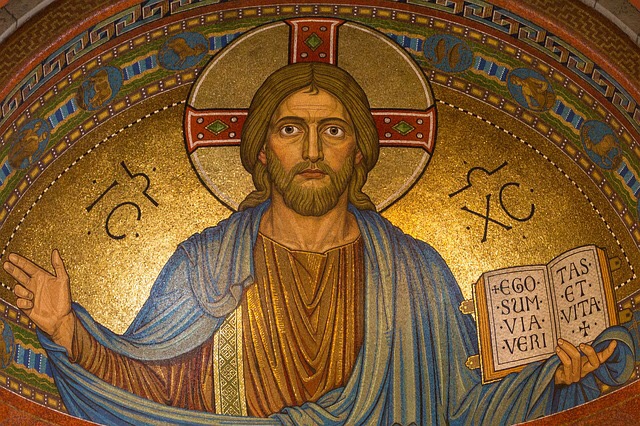At the end of Tolkien’s epic The Lord of the Rings there is a scene to behold. Far into the dark and evil land of Mordor a solemn and weary Samwise Gamgee looked up into the sky, saw the clouds part, and beheld a single star. Tolkien describes this moment like this, “Sam saw a white star twinkle for a while. The beauty of it smote his heart, as he looked up out of the forsaken land, and hope returned to him. For like a shaft, clear and cold, the thought pierced him that in the end the Shadow was only a small and passing thing; there was light and high beauty forever beyond its reach.”[1]
In the evil and fallenness of our own present existence we often feel a similar despair, and may be tempted to lose all hope. But like the single star that smote Sam’s heart with a beauty that revived his soul for the journey before him, so too, there is one thing that can smite our hearts with a fierce beauty and revive us again – the good news, or the gospel of, Jesus Christ. “One new discovery of the glory of Christ’s face and the fountain of His sweet grace and love…” says Jonathan Edwards “…will do more towards scattering clouds of darkness and doubting in one minute than examining old experiences by the best mark that can be given a whole year.”
Being that it is Easter weekend, I want to remind you of great gospel truth. To see the wonders of the gospel I want to take you to 1 Corinthians 15:1-7, where we see two things: A Reminder of the Gospel (v1-2) and An Explanation of the Gospel (v3-7)
A Reminder of the Gospel (v1-2)
Here at the end of a long letter to the Corinthians Paul begins chapter 15 (which contains his famous defense of the resurrection) by reminding them of the gospel he had once preached to them. He says they not only received it at first in the past, but that they continue in the present moment to stand fast in it and are being saved by it. So for these Corinthians, and really for all Christians, believing in the gospel is part of our past, something that we at one time did. Whether it was from our parents, friends, a book, a preacher or however we heard it, we heard the gospel, felt convinced of it’s truthfulness, repented of our sin, embraced it by faith, and experienced the power of God in salvation – this is a past memory for all Christians. But notice how Paul is speaking here: belief in the gospel is not just something involving our past, it’s also something that has an ongoing present and future importance to us.[2]
Yes our past is settled, but because of the gospel our present is secure and our future is certain. Thus, we can hold fast to Christ amid the troubles of this world knowing that Christ has been, is, and always will be holding fast to us.
Note the “if” as v2 ends? After all the glory of receiving, standing in, and continuing to be saved by the gospel, Paul says “if you continue to hold fast to the word I preached to you – unless you believed in vain.” There is a warning for us here, a call to examine how we first believed in Christ. We will only stand in and be saved by the gospel in the end if we received it correctly at the beginning, that is in true repentance and true faith. By this Paul means, if we cease to hold fast to the gospel in the present moment it is evidence that we, at first, believed in the gospel in vain. Or we can read this another other way – if we truly believed in the gospel at first, we will hold fast to it for all our days.
Well what is the gospel Paul is eager to remind them of?
An Explanation of the Gospel (v3-7)
Let me read these words again, so they wash over you afresh. “For I delivered to you as of first importance what I also received: that Christ died for our sins in accordance with the Scriptures, that He was buried, that He was raised on the third day in accordance with the Scriptures, and that He appeared to Cephas, then to the twelve. Then He appeared to more than five hundred brothers at one time, most of whom are still alive, though some have fallen asleep. Then He appeared to James, then to all the apostles.”
Paul is eager to remind them that this gospel isn’t something he made up, but is a gospel he received from God. And more so, this gospel he’s about to explain to them carries first importance, it carries an unmatched prominence, so that nothing is more central or precious to the Christian than the gospel. But again I ask, what gospel? Beginning in v3 Paul explains the gospel through a series of propositions:
Proposition 1: Christ Died for Sins
That Christ died for sins carries with it some implied meaning Paul doesn’t explicitly speak of here. Firstly, for Christ to die for sins implies that the eternal Christ once came to us, that He in His Person bridged the gap between God and man. Truly God He became truly Man in His incarnation, He walked among us, He lived among us, He became and is now forever the God-Man. Secondly, for Christ to die for sins implies that man is in a desperate sinful condition and cannot save himself. I’m afraid this is a point many people leave out of the gospel because it is so unwelcome to the heart of man. If the bad news about ourselves is left out we not only have no true understanding of the good news, we have what amounts to a kind of gospel-lite where one learns how to be saved without learning why one needs to be saved. Thirdly, for Christ to die for sins implies that Christ died for sin. Which means He absorbed the wrath of God due to us, in His body, in our place, as our substitute. The wages of sin is death, and because Jesus drank the full cup of God’s wrath dying for our sins as the Old Testament Scriptures had foretold, we can have the free gift of eternal life.
Proposition 2: Christ was Buried
The culmination of the shame Christ bore for us was not just that He condescended and came to us, not just that He lived a life acquainted with sorrow, not just that He died on the cross for us, but that He was buried. That the very Author of life laid dead in a tomb is staggering. It shows us the ultimate end sin will bring us to if we remain in it. It shows us the truth that because He truly expired we can now truly be born anew. He embraced the chill of death that we could feel the warmth of new life.
Proposition 3: Christ was Raised
Wonder of wonders, when Jesus died, did He stay dead? No! He rose! He rose! This resurrection was the divine stamp of approval that the Father had accepted the Son’s sacrifice. This resurrection was the validation that Jesus was truly the Son of God in power. This one act sets Jesus apart from all others. Think of all other religious teachers what you will, there has only been and will ever only be One who rose from the dead. Where is Moses? Where is Mohammed? Where is Buddha? Where is Confucius? Where is Gandhi? Where is Mother Teresa? In the grave. Where is Jesus? Ruling at right hand of His Father, interceding for and building His Church. As they did of His death, so too, the Old Testament Scriptures told us Jesus would rise.
Proposition 4: Christ Appeared to Many
After rising from death, Jesus made public appearances to all the leaders of the early Church[3], and a group of 500 people who are, for the most part, still alive. You know what that’s called. Verifiable data. He came, He lived, He died, and He publicly rose.
These are Paul’s gospel propositions that he employs to explain the gospel to us.
I do wonder if on the surface of things some of you think writing to Christians about what the gospel is is as unnecessary as explaining what a hammer is to a group of carpenters.[6] But as Paul was eager to remind these Corinthians of the gospel, I’m eager to remind you as well.
A deep belief and embrace of the gospel and the kind of full life the gospel leads to is a mark of a healthy local church. Sure we gather together to sing of the gospel, to pray over and from the gospel, to hear preaching about the gospel, and to see the gospel in the sacraments, but has this gospel gotten into your soul? Has it reminded you of the propositions of good news? I pray it has, and I pray it continues to do so.
As that small star high up in the sky smote Sam Gamgee’s heart with beauty, may the gospel, may this gospel, ever smite your heart with the beauty of God.
Citations:
[1] J.R.R. Tolkien, The Return of the King, quoted in Ray Ortlund’s The Gospel, page 55.
[2] Stephen Um, 1 Corinthians: The Word of the Cross, Preaching the Word Commentary, page 259.
[3] Craig Blomberg, 1 Corinthians, page 296.
[4] Stephen Um, 1 Corinthians: The Word of the Cross, Preaching the Word Commentary, page 261.
[5] Christopher Ash has a book about this that’s worth reading, Zeal Without Burnout.
[6] Greg Gilbert speaks of this in the opening pages of his small book, What is the Gospel?










